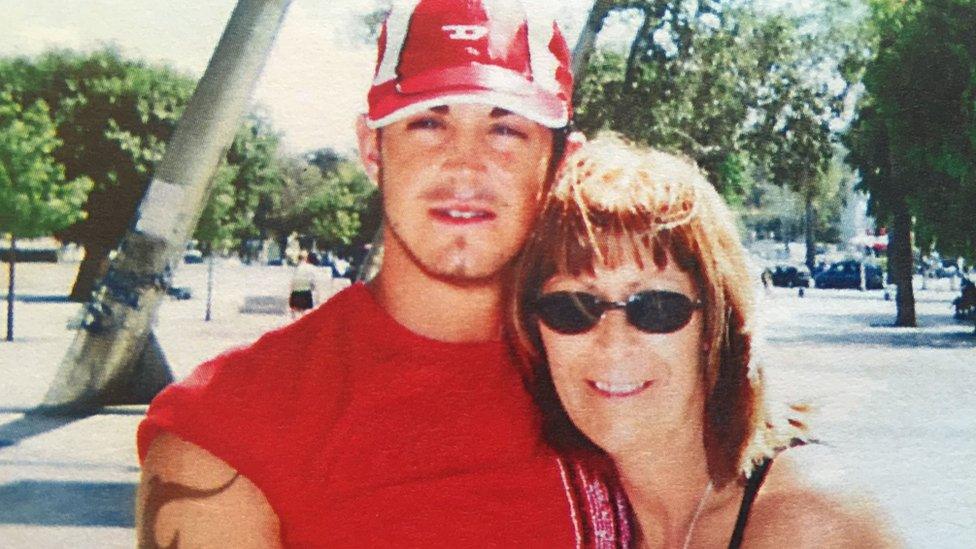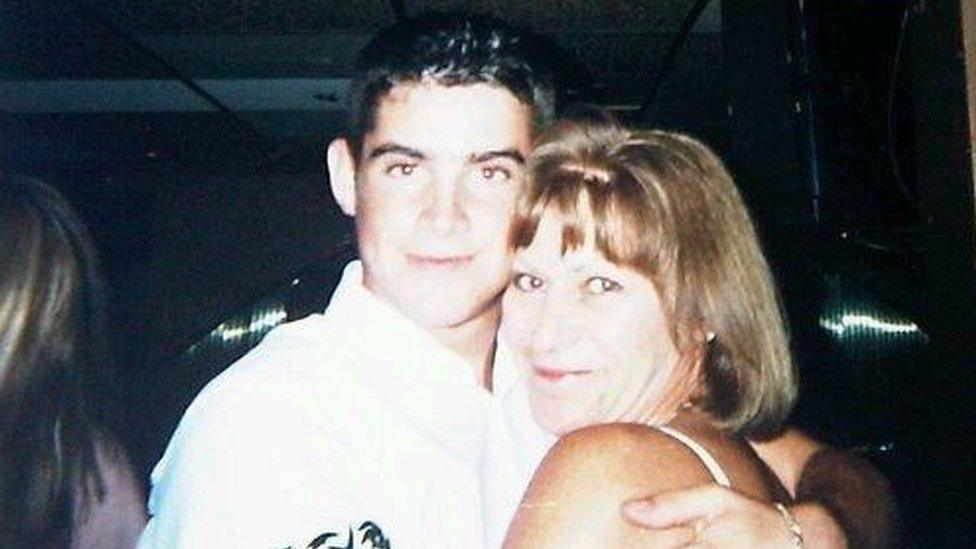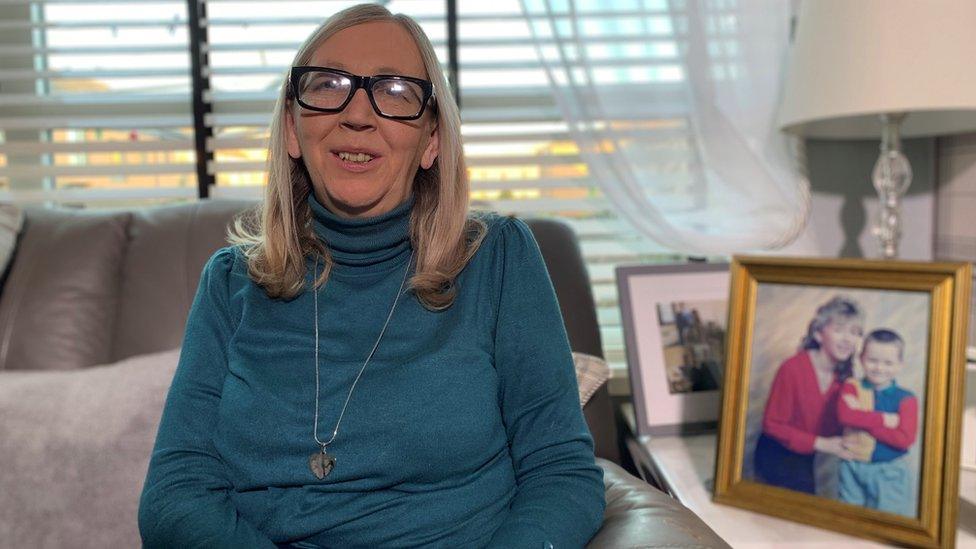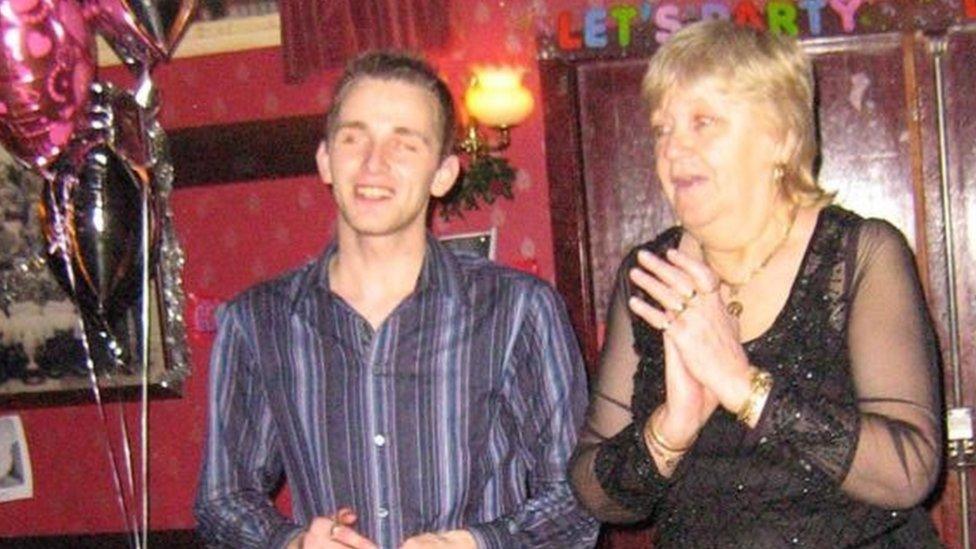How am I going to pay for my loved one to come back?
- Published

Michael Porter's mother Jean Hanlon died in Crete in 2009
When Michael Porter discovered his mother Jean Hanlon had been found dead in Crete, he did not know where to turn for help.
"That moment when you find out your loved one has died, you automatically go into fight or panic mode," he says.
A post-mortem examination concluded the 53-year-old, from Dumfries, had drowned but Michael said his family feared foul play and information later emerged suggesting injuries consistent with a struggle.
Michael said navigating the Greek legal system and language barrier was extremely difficult for him and his family while they were grieving, especially when they contested the official version of events.
He is now hopeful that a new service set up by the Scottish government and Victim Support Scotland to assist families whose relatives are killed abroad will help people like him.
"When you are first told about someone dying abroad there are so many things that come into play," Michael said. "You don't know who to trust, what's the right way, the wrong way."

Michael said he and his family have had to battle for 13 years to try to find out what happened to their mum
Back in 2009, Michael and his family got little help from diplomats and officials and had to start their own fundraising campaign in order to bring their mother's body home.
"Unfortunately money does pay the way to get you answers and that was something we struggled with a lot at the beginning," he said. "It was sort of the blind leading the blind. Ambassadors were very quick to tell us what they couldn't do."
Michael said he and his family have had to "battle for 13 years" to try to find out what happened to their mum, who was living in Crete at the time of her death. The case has been reopened and is ongoing.
He said he wishes he could have been able to focus on what had happened instead of concerns about the costs.
"It's a really sad thing to have to think how am I going to pay for my loved one to come home," he said.
The specialist service from Victim Support Scotland, set up with £40,000 Scottish government funding, will offer financial and emotional support to families living in Scotland affected by an overseas murder or culpable homicide.
The money will help families get access to the support they need to meet`costs, such as repatriation and translation services.
It follows feedback from the UK All Party Parliamentary Group on Death Abroad Consular Services and Assistance, which has heard from families that they feel lost and abandoned.

Julie Love has campaigned tirelessly for more help for families who have lost loved ones overseas
Julie Love has campaigned tirelessly for more help for families who have lost loved ones overseas since the death of her son Colin in 2009. He was just 23 when he died while swimming off a Venezuelan island.
She said even after 13 years it had not got any easier but she is determined to help other families navigate the complicated systems and institutions involved when a loved one dies abroad.
Julie set up the charity Deaths Abroad You're Not Alone (DAYNA), to help others. She said the funding would not have helped her family as Colin's death was an accident but it is a start.
"You know it wouldn't have helped me but there are so many other families that it will help in the future," she said.
"I'm delighted. I mean it's been a long time coming - I think in England and Wales, they've maybe had funding from the Foreign Office and the UK Government for at least 10 years, so for us to get it in Scotland now it's a step in the right direction."

Julie's son Colin died while swimming off a Venezuelan island in 2009
The Foreign, Commonwealth and Development Office provides consular support for families who have been bereaved through homicide and in some cases of suspicious death abroad.
Kate Wallace, chief executive of Victim Support Scotland, said: "This grant will make a very real difference to families who are bereaved by murder and culpable homicide abroad.
"In addition to the trauma of losing a loved one this way, families often must contend with issues and additional expenditure around international travel, language differences, dealing with the legal system of another country and the repatriation of their family member.
"With this additional funding, we can now extend the support we give to families in Scotland to include those bereaved by events abroad."
Justice Secretary Keith Brown said the new funding would help families access support and advice more easily.
He said: "What is quite clear from talking to people who have been in this tragic situation, where a death abroad occurs of a loved one, is the pressures that can apply to families and friends in that circumstance can be enormous."
The minister said there were often language barriers and justice systems that worked in a different way.
"So we've been determined to try and bring together as best we can the different agencies which will be involved in providing that support to make it as easy as possible for people who suffer the tragedy of a death abroad of a loved one," he said.